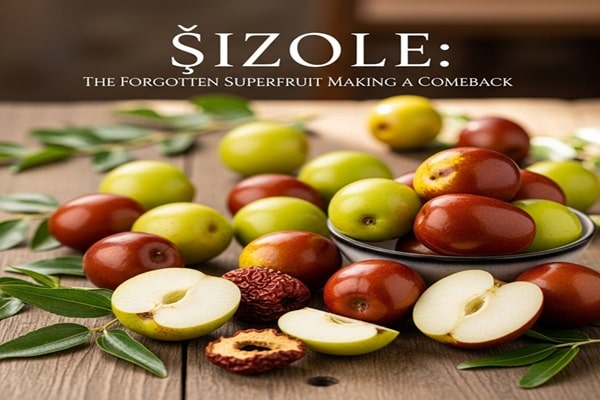
Žižole: The Forgotten Superfruit Making a Comeback

If you’ve never heard of žižole before, you’re not alone. Known in English as jujube, Chinese date, or red date, this little fruit has been loved in Asia and the Mediterranean for centuries but is still somewhat of a hidden gem in other parts of the world. That’s starting to change, though—thanks to health-conscious foodies, herbal medicine enthusiasts, and adventurous home cooks who are rediscovering the incredible benefits of this tiny superfruit.
In this guide, we’ll walk through everything you need to know about žižole—its history, health benefits, nutritional profile, and even how you can grow or cook with it at home.
What Exactly Is Žižole?
Žižole comes from the Ziziphus jujuba tree, a hardy plant that thrives in warm, dry regions. It belongs to the buckthorn family (Rhamnaceae) and produces olive-sized fruits that start green, turn reddish-brown as they ripen, and can be enjoyed fresh, dried, or cooked.
The tree itself can grow 5–10 meters tall, with glossy green leaves, thorny branches, and small yellow-green flowers in summer. By fall, you’ll see it covered in sweet, crisp fruits with edible skin and a single pit inside.
Think of it as a cross between a tiny apple (when fresh) and a date (when dried).
A Quick History Lesson
Žižole has a story that goes back thousands of years.
-
China: Native to northern China, žižole has been cultivated for over 4,000 years. In Traditional Chinese Medicine (TCM), it’s considered a tonic fruit that calms the mind, nourishes the blood, and strengthens digestion.
-
Cultural Spread: From China, it spread to Korea, India, the Middle East, North Africa, and eventually Southern Europe.
-
Europe: In countries like Croatia, Italy, and Slovenia, žižole is part of autumn harvest festivals and is often turned into jams, teas, or rakija (fruit brandy).
Wherever it went, it carried a reputation as both a nutritious food and a natural medicine.
Why Everyone’s Talking About Žižole: Key Health Benefits
So, what makes this fruit so special? Here’s a breakdown of its top health perks:
1. Antioxidant Powerhouse
Packed with polyphenols and flavonoids, žižole fights free radicals in your body. That means less oxidative stress, slower aging, and protection for your cells.
2. A Vitamin C Boost
Just 100 grams of fresh žižole delivers 60–80% of your daily Vitamin C needs—great for your immune system, skin, and healing process.
3. Mineral Support
It’s a natural source of iron, potassium, calcium, magnesium, and phosphorus—all essential for healthy blood, bones, nerves, and heart function.
4. Natural Sleep Aid
If you struggle with stress or insomnia, žižole might help. Compounds like saponins and jujuboside A have calming effects on the nervous system.
5. Digestive Friendly
Thanks to dietary fiber and digestive enzymes, it can help ease bloating, regulate bowel movements, and improve gut health.
6. Anti-Inflammatory & Immune Boosting
Studies suggest žižole has anti-inflammatory, antibacterial, and antiviral properties—making it a natural way to support immunity.
Nutrition Snapshot (Per 100g Fresh)
-
Calories: 79 kcal
-
Carbohydrates: 20 g
-
Fiber: 2.6 g
-
Vitamin C: 69 mg
-
Potassium: 250 mg
-
Iron: 0.5 mg
-
Protein: 1 g
-
Fat: 0.2 g
Low in calories, nutrient-dense, and naturally sweet—pretty impressive for such a small fruit!
How to Enjoy Žižole
The best thing about žižole? It’s versatile. Here’s how you can use it in your daily routine:
Fresh
Crisp and apple-like, perfect for fruit bowls, salads, or eating out of hand.
Dried
Chewy and sweet, like dates or figs. Great in:
-
Trail mixes
-
Herbal teas
-
Yogurt or cereal toppings
-
Baked goods (bread, muffins, cakes)
Syrups & Jams
In the Balkans, žižole is boiled with sugar and lemon for thick syrups—often used for winter immunity.
Jujube Tea
Popular in Asia, made by simmering dried žižole with ginger and cinnamon. Known to reduce stress and promote better sleep.
Alcohol Infusions
In Croatia and Montenegro, žižole is steeped in rakija or brandy to create a warming, medicinal liqueur.
Also Read : The Rising Popularity of the Swimsuit Edition [ABBB] – 1.20 21 Swimsuit Edition – Chapter
Where Can You Find Žižole?
-
Asia & Europe: Widely available in China, India, Turkey, Croatia, and Italy. Look for them in farmers markets, herbal shops, or organic markets.
-
North America: Check Chinese and Korean supermarkets (dried fruit section) or order online from herbal retailers like iHerb. In some states (California, Arizona, Texas), you may even spot them at local farmers markets.
Thinking of Growing Žižole? Here’s How
Yes—you can grow your own! Even in a backyard or balcony garden.
-
Soil & Sunlight: Loves sandy or loamy soil and full sun. Avoid waterlogged spots.
-
Climate: Best in USDA zones 6–10. Drought-tolerant once established but needs some winter chill to fruit.
-
Planting: Start in early spring, spacing trees about 10–15 feet apart.
-
Maintenance: Light pruning in winter, compost in spring, minimal fuss otherwise.
-
Harvest: Fruits ripen late summer to fall. Eat fresh or dry for long-term storage.
Žižole vs. Dates: What’s the Difference?
Although often called “red dates,” žižole and regular dates are not the same.
| Feature | Žižole (Jujube) | Dates (Phoenix dactylifera) |
|---|---|---|
| Origin | China | Middle East/North Africa |
| Texture | Crisp fresh, chewy dried | Always soft & sticky |
| Calories (100g) | ~79 kcal | ~277 kcal |
| Sugar | Lower | Higher |
| Vitamin C | High | Very low |
| Glycemic Index | ~25–30 (low) | ~42–55 (moderate) |
So if you’re looking for a lower-calorie, Vitamin C-rich alternative to dates, žižole wins hands down.
Žižole in Traditional Medicine
In Traditional Chinese Medicine, žižole is classified as a shen tonic, used for:
-
Calming anxiety and improving sleep
-
Supporting menstrual health
-
Boosting immunity and energy
-
Improving appetite and digestion
-
Slowing skin aging
This makes it not just a fruit, but a wellness ally in holistic practices.
Why Žižole Deserves a Spot in Your Diet
Here’s the bottom line: žižole checks all the boxes for modern health-conscious living.
Low-calorie, nutrient-dense snack
Natural stress and sleep support
Immune-boosting and anti-inflammatory
Easy to add to meals, teas, and desserts
Sustainable and drought-tolerant crop
Whether you’re looking for a natural wellness booster, a unique fruit to try in your recipes, or even a tree to grow at home, žižole is worth exploring.
Final Thoughts
Small but mighty, žižole (jujube) has been nourishing people for thousands of years. Now, it’s ready for a well-deserved comeback as a superfruit of the future.
So next time you spot them fresh, dried, or in tea form, give them a try. You might just discover your new favorite fruit—for your taste buds, your health, and your overall well-being.











Salma Shah Age: Everything You Need to Know About Her Life and Career